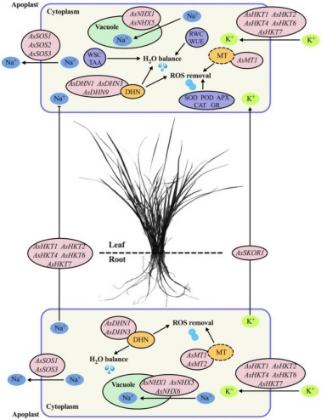Water and oxidative homeostasis, Na+/K+ transport, and stress-defensive proteins associated with spermine-induced salt tolerance in creeping bentgrass
2022年03月14日 08:33
DOI:https://doi.org/10.1016/j.envexpbot.2021.104659
WanGeng,YongsenQiu,YanPeng,YanZhang,ZhouLi
Abstract:
As a pivotal plant growth regulator, spermine (Spm) participates in the regulation of salt tolerance in plants. Creeping bentgrass was pretreated with or without Spm (100μM) and then subjected to a prolonged period of salt stress (24 days). Results showed that the Spm-pretreated plants maintained significantly higher root vitality, leaf relative water content, photosynthesis, water use efficiency, osmolytes accumulation, and antioxidant enzyme activities as well as lower osmotic potential and oxidative damage in leaves under salt stress. The application of Spm significantly decreased Na+accumulation in root and leaf and K+loss in roots, resulting in higher K+/Na+ratio in leaf and root; the Spm enhanced the SOS pathway and also up-regulated HKTs and AsSKOR1 associated with the homeostasis of Na+and K+in leaves and roots; the expression ofAsNHX1,AsNHX5, andAsNHX6was enhanced by the Spm contributing to better capacity of Na+compartmentalization in cells. The application of Spm also further increased the AsHAL2 expression in leaves under salt stress associated with the enhancement of sulfur transfer and assimilate. In addition, the upregulation of metallothionein genes (AsMT1andAsMT2) and dehydrin genes (AsDHN1,AsDHN3, andAsDHN9) and the accumulation of DHN (56 KDa) induced by the Spm could be an important regulatory mechanism of salt tolerance in creeping bentgrass. Current findings reveal the important role of Spm in regulating water and oxidative homeostasis, Na+/K+transport, and stress-defensive proteins accumulation for the improvement of salt tolerance in plants.
